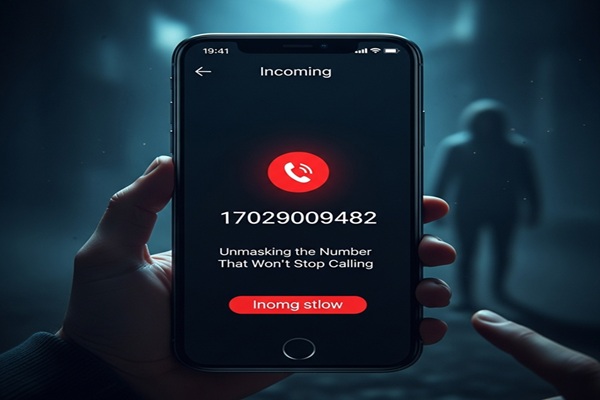If your phone just buzzed with 17029009482, you’re not alone in feeling that mix of curiosity and dread. Is it a scam, a legit business, or just a wrong number with a vendetta? From Los Angeles to Lexington, this ten-digit enigma has been making waves—and raising eyebrows—across the country.
Let’s break it down, get to the bottom of the mystery, and learn how to handle calls from numbers like this without losing your mind.
1. The Digital Ghost That Won’t Stop Ringing
It usually starts the same way: your phone lights up with 17029009482, sometimes multiple times a day, often at odd hours. Answer, and… silence. Or a robotic voice offering limited-time deals. Or worse, vague threats about “account suspensions.”
This isn’t a simple misdial. 17029009482 is part of a modern ecosystem of robocalls, spoofed numbers, and call centers, both legitimate and shady. These calls exploit the gaps in telecom regulations, leaving you confused and frustrated.
2. Where Does 17029009482 Come From?
Technically, the number is from the United States. The “1” country code places it in North America, and the “702” area code points to Las Vegas, Nevada.
But here’s the catch: in today’s digital world, area codes are almost meaningless. Thanks to VoIP technology, a call can appear to come from 702 even if it’s bouncing from servers in New Delhi or Nairobi. This is caller ID spoofing in action—masking the real origin of the call.
Sometimes, the number might belong to an innocent person completely unaware their digits are being used. Other times, it’s a VoIP number purchased in bulk by telemarketing firms or scammers. Either way, it’s designed to confuse and evade detection.
3. Common Patterns: What People Are Experiencing
A quick look at Reddit threads, forums, and call-report sites reveals a striking pattern:
-
Repeat Calls: Often multiple times in a single day.
-
Silence or Clicks: Pick up the phone and hear… nothing—or a sudden click.
-
Scam Attempts: Fake debt collections, insurance “discounts,” or pushy requests for personal info.
-
No Voicemails: Rarely leaves a message, likely to avoid spam filters.
One user, u/CallBlocked2025, wrote:
“They called me six times in two days. Every time I answered, it clicked and hung up. I finally blocked it, but how many numbers are out there like this?”
Indeed, 17029009482 is part of a much larger trend—over 50 billion robocalls hit U.S. phones every year, according to YouMail’s Robocall Index.
4. Is It Dangerous or Just Annoying?
Not every call from this number is overtly dangerous, but it’s a fine line between annoyance and risk. Some calls are harmless sales pitches; others are attempts to steal your personal information.
Here’s what you should never do:
-
Don’t give out personal info: Names, addresses, SSN, or credit card numbers.
-
Don’t press numbers: A voice saying “press 1 to speak to a rep” is a trap.
-
Don’t call back: Unless absolutely sure it’s legitimate, returning the call confirms your number is live.
Even if you ignore it, similar numbers may appear the next week. It’s a constant game of whack-a-mole.
5. Why 17029009482 Can Be So Hard to Trace
The messiness of numbers like 17029009482 isn’t an accident—it’s systemic. Here’s how it works:
-
Overseas Call Farms: Call centers in countries with lax oversight make thousands of calls using U.S.-based VoIP numbers.
-
Bulk Number Leasing: Telecom resellers lease massive blocks of numbers to firms with minimal background checks.
-
Regulatory Gaps: Laws like the Telephone Consumer Protection Act exist, but enforcement is slow and penalties are minor compared to profits.
This setup allows robocall operations to run like a well-oiled machine, and numbers like 17029009482 are just one cog in the system.
6. Tech to the Rescue (Sort Of)
Regulators and tech companies are slowly fighting back. In 2021, the FCC pushed for STIR/SHAKEN protocols to verify caller ID information. Progress is steady but patchy.
Apps can help:
-
Hiya
-
RoboKiller
-
Truecaller
-
Nomorobo
Many smartphones now flag suspicious numbers as “Spam Risk” or “Scam Likely.” Still, for every blocked number, new ones appear, keeping the cat-and-mouse game alive.
7. The Emotional Side of Robocalls
Robocalls like 17029009482 aren’t just inconvenient—they take an emotional toll. Imagine:
-
Waiting for a job call, and it’s a scam instead.
-
Elderly parents panicking over “account issues.”
-
Dealing with family emergencies while spam calls flood your phone.
Numbers like this chip away at trust in everyday communication. It’s more than irritation—it’s subtle stress in your daily life.
8. How to Fight Back
You don’t have to feel powerless. Here’s your action plan:
Report the Number
-
FTC Complaint Assistant: https://reportfraud.ftc.gov
-
FCC Spam Reporting: https://consumercomplaints.fcc.gov
Block & Filter
-
Use built-in spam filters or install call-blocking apps that update blacklists automatically.
Enable STIR/SHAKEN
-
Contact your carrier to confirm if this authentication is active on your account.
Educate Others
-
Especially older or less tech-savvy family members who are more vulnerable to scams.
9. The Future of Phone Scams
AI-generated voices and deepfakes are changing the game. Imagine:
-
A call from your boss’s voice asking for urgent money.
-
A voice mimicking a loved one to trick you into acting fast.
It’s not science fiction—it’s already happening. Awareness is your best defense. Knowing that 17029009482 and numbers like it are suspicious gives you the edge.
Also Read : The Role of Hürrilet in Shaping Contemporary Ideals of Liberty
10. The Bottom Line
So, should you worry about 17029009482? Yes—but in the right way.
-
Ignore suspicious calls.
-
Block repeat offenders.
-
Report them to authorities.
Remember: these numbers are symptoms of a larger problem—the commercialization and automation of our communications. Every blocked number is a small step toward reclaiming control of your phone and protecting your peace of mind.
Next time 17029009482 lights up your screen, let it go to voicemail. Smile, block it, and move on—because now, you know exactly what you’re dealing with.
